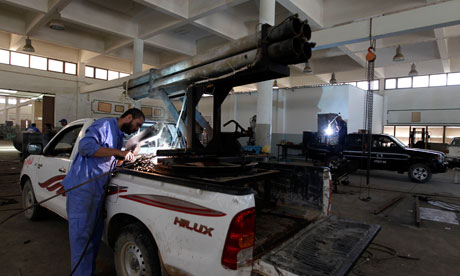The lucrative oil industry has been shut down by the fighting.
In early April, Mazin Ramadan left his American wife and two children in Seattle and flew to this Libyan rebel stronghold to help the opposition sort out its shaky finances.
Three months later, things are looking as bleak as ever. "We're broke," said Ramadan, a Libyan American who founded a software tech company in Seattle and advises the rebel Transitional National Council on finances and oil. Even as rebel commanders predict that victory over Libyan leader Moammar Kadafi is near, the rebel leadership is desperately short of cash to fight the rebellion and run civilian affairs.
The lucrative Libyan oil industry, which normally earns billions of dollars in hard currency, has been shut down by the fighting. Salaries for the rebel government's workers haven't been paid in two months. There is precious little cash to buy the imported fuel needed for the war effort and for the economy in eastern Libya, which the rebels control.
The council is beseeching Arab and Western nations to offer cash or credit. "We're getting decimated on the financial front lines," Ramadan said this week. As he spoke, the lights flickered and died in the conference room at a villa dating to the Italian colonial era that serves as a council office in downtown Benghazi. Fuel shortages have forced daily six-hour brownouts.
The council has been buying fuel in Europe on credit. But last week, a European financial company that had provided $500 million in loans told the council that it could no longer shoulder the risk and shut down the credit line. About $100 million donated by Qatar has nearly been spent, Ramadan said, and $200 million promised by Turkey has yet to arrive.
Several tankers loaded with fuel from Europe have left the Benghazi port without unloading after the council couldn't pay cash, he said. The vast petrochemical complexes at Port Brega and Ras Lanuf, seized from the rebels by government forces this spring, have been shut down. Also closed is the natural gas pipeline that normally fuels electricity production in Benghazi and other eastern cities. That means that rebel leaders in the country that is the world's 17th-largest producer of oil must import all their fuel.
Several nations have promised to provide cash, Ramadan said, but only Qatar has delivered. "We hear a lot of promises, but it's a lot easier to promise than to deliver," he said. "We don't count on it unless it's sitting in our account." Ramadan said he is pursuing new credit lines. His two cellphones rang constantly as he spoke. The council has sought loan guarantees backed by billions of dollars in frozen Libyan government assets overseas. But weeks of negotiations have failed to pry loose guarantees,
Ramadan said. In a July 7 letter to Secretary of State Hillary Rodham Clinton, four U.S. senators led by Sen. John McCain (R-Ariz.) asked Clinton to help unlock the assets for Libyan humanitarian aid. The letter reminded Clinton of her recent promise to help put the rebel council "on firmer financial footing." Rebel finances "are in a perilous state," the letter said. The United States has authorized $25 million in nonlethal military assistance to the rebels and $53 million in humanitarian aid.
But Ramadan said loan guarantees backed by frozen Libyan assets would have a much bigger effect on the effort to topple Kadafi, a declared U.S. policy goal. The main crisis in the east is financial, not humanitarian. Thanks to unusually heavy winter rains, eastern Libya is flush with grains, fruits and vegetables.




